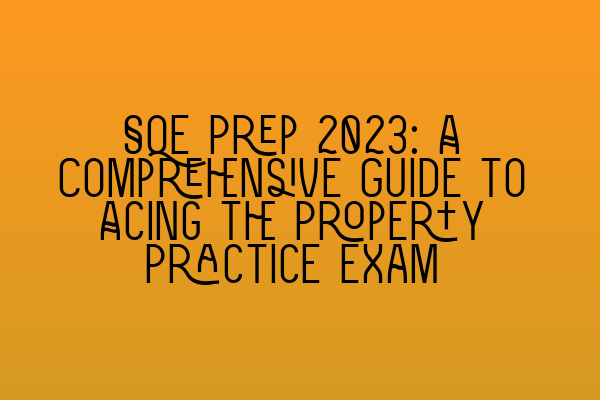SQE Prep 2023: A Comprehensive Guide to Acing the Property Practice Exam
As you embark on your journey to become a qualified solicitor, mastering property law is essential. The Property Practice Exam of the Solicitors Qualifying Examination (SQE) is a crucial step in achieving your goal. To help you excel in this exam, we have prepared a comprehensive guide that will equip you with the knowledge and skills necessary to succeed.
The Property Practice Exam tests your understanding of various aspects of property law, including land law, conveyancing, leases, and easements. To excel in this exam, you need to have a solid foundation in these areas. Let’s dive into our comprehensive guide to gain the insights needed to ace the Property Practice Exam:
1. Understand the Exam Format:
Start by familiarizing yourself with the exam format to know what to expect on the big day. The Property Practice Exam consists of multiple-choice questions (MCQs) and written assignments. You will need to demonstrate your knowledge and problem-solving abilities within a limited timeframe. Be sure to practice under timed conditions to improve your speed and accuracy.
2. Study Land Law:
Land law is a fundamental component of the Property Practice Exam. It covers topics such as legal estates and interests, co-ownership, adverse possession, and mortgages. To strengthen your understanding, refer to reliable textbooks, study guides, and online resources. Additionally, taking a property law course specifically tailored for the SQE exam can provide valuable insights and expert guidance.
3. Master Conveyancing:
Conveyancing is a core skill for property lawyers. It involves the transfer of property ownership from one party to another. Familiarize yourself with the conveyancing process, including drafting contracts, conducting searches, and dealing with financing arrangements. A good understanding of the Land Registration Act 2002 and the Law of Property (Miscellaneous Provisions) Act 1989 is crucial.
4. Focus on Leases:
Leases are commonly encountered in property transactions. Ensure you have a solid grasp of the essential elements of a lease, the rights and obligations of landlords and tenants, and the termination and renewal processes. Be prepared to identify relevant leasehold covenants and analyze their implications.
5. Grasp Easements:
Easements are legal rights that allow one party to use or access another’s property. Gain a clear understanding of the different types of easements, such as rights of way and rights of light, and the principles governing their creation, modification, and termination.
6. Practice with SQE 1 Property Practice Exam Questions:
To familiarize yourself with the type of questions that may appear on the exam, make use of SQE 1 practice exam questions. These questions will challenge your knowledge of property law and provide valuable practice in answering MCQs. Check out our related article “SQE 1 Practice Exam Questions” for a comprehensive resource.
7. Take Mock Exams:
Mocks are an excellent way to simulate the exam environment and assess your preparedness. SQE 1 Practice Mocks, such as FLK1 and FLK2, can help you identify areas where you need improvement and refine your exam technique. Explore our related article “SQE 1 Practice Mocks FLK1 FLK2” for detailed information.
8. Enroll in SQE 2 Preparation Courses:
SQE 2 preparation courses provide comprehensive guidance on all aspects of the exam, including property law. These courses offer structured learning opportunities, expert instruction, and practice assignments designed to enhance your skills and knowledge. Consider joining an SQE 2 preparation course to boost your chances of success. Find out more in our related article “SQE 2 Preparation Courses”.
9. Explore SQE 1 Preparation Courses:
SQE 1 preparation courses can help you develop a strong foundation in property law and other core legal subjects. These courses cover key topics in detail, provide practice materials, and offer guidance on exam strategy. Check out our related article “SQE 1 Preparation Courses” to explore available options.
10. Check SRA SQE Exam Dates:
Stay up-to-date with the SRA SQE exam dates to plan your preparation accordingly. Knowing when the exam will take place enables you to create a study schedule and allocate sufficient time for revision and practice. Stay informed by referring to our article on “SRA SQE Exam Dates”.
In conclusion, acing the Property Practice Exam requires a combination of comprehensive knowledge, practical skills, and effective exam preparation. By following these tips and utilizing the available resources, you can enhance your chances of success. Remember to practice regularly, seek guidance from experts, and approach the exam with confidence. Good luck on your journey toward becoming a qualified property law solicitor!
